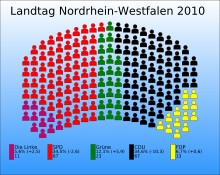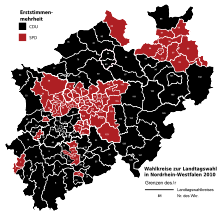- North Rhine-Westphalia state election, 2010
-
North Rhine-Westphalia state election, 2010 
2005 ← 9 May 2010 → Next All 181 seats of the Landtag of North Rhine-Westphalia First party Second party Third party 


Leader Jürgen Rüttgers Hannelore Kraft Sylvia Löhrmann Party CDU SPD Green Last election 89 seats, 44.8% 74 seats, 37.1% 12 seats, 6.2%[1] Seats won 67 67 23 Seat change -22 -7 +11 Popular vote 2,681,736 2,675,536 940,770 Percentage 34.6% 34.5% 12.1% Fourth party Fifth party 

Leader Andreas Pinkwart Bärbel Beuermann Party FDP The Left Last election 12 seats, 6.2% n/a[2] Seats won 13 11 Seat change +1 +11 Popular vote 522,437 434,846 Percentage 6.7% 5.6%
Minister-President before election
Elected Minister-President
Hannelore Kraft
SPDThe North Rhine-Westphalia state election, 2010, was an election held on May 9, 2010, to elect members to the Landtag (state legislature) of the German state of North Rhine-Westphalia. The incumbent government at the election was the Christian Democrat (CDU)–FDP administration of Minister-President Jürgen Rüttgers. The main opposition was the Social Democrats (SPD), led by Hannelore Kraft since 2005.
As the election was held in Germany's most populous state, it was seen as a test of the federal government's performance after seven months in office. The federal government, also a CDU-FDP coalition, was accused of being indecisive as the two coalition partners had different aims.[3] As the Bundesrat (upper house) is made up of representatives from the states, the federal government risked losing its narrow majority in that house.[4]
Contents
Election issues
Other factors in the election were the proposed EU bailout of Greece as well as a fundraising scandal in the governing party and debate over the state's education policy.[5]
Results
The election was conducted on a mixed member proportional representation basis, with 128 constituency or local electorate seats, and the remaining seats filled by party lists from the overall proportion of votes received by each party. The CDU won 67 and the SPD won 61 constituency seats. Unlike the 2005 state election, no overhang seats were required, so the number of seats to be filled was 181 (down from 187), the lowest number of members required by the state's Electoral Act.
The turnout of 59.3% was the second lowest at a NRW state election (the lowest being the 2000 election, at 56.7%.) Both major parties did poorly — the CDU achieved its worst ever result, while the SPD achieved its worst result since 1950. It was also the first election since 1950 where a left-wing party had won seats.
Summary of the 9 May 2010 election results for the Landtag of North Rhine-Westphalia Party Party list votes Vote % (change) Seats (change) Seat % Christian Democratic Union (CDU) 2,681,736 34.6% (-10.3%) 67 (-22) 35.44% Social Democratic Party (SPD) 2,675,536 34.5% (-2.6%) 67 (-7) 35.44% Alliance '90/The Greens (Die Grünen) 940,770 12.1% (+5.9%) 23 (+11) 12.1% Free Democratic Party (FDP) 522,436 6.7% (+0.6%) 13 (+1) 6.8% Die Linke (previously PDS and WASG) 434,846 5.6% (+2.5%) 11 (+11) 5.82% Pirate Party 119,581 1.5% (+1.5%) - Pro NRW 106,932 1.4% (+1.4%) - All Others 277,487 3.6% - - Totals 7,759,325 100.0% 181 (-6) 100.0% Opinion polling
The following opinion polls were conducted during the campaign[6]:
Pollster Date CDU SPD GRÜNE FDP DIE LINKE Other Emnid[7] 06.05.2010 37 % 33 % 12 % 8 % 5 % 5 % Forsa[7] 06.05.2010 37 % 37 % 10 % 6 % 5 % 5 % GMS[7] 05.05.2010 37 % 33 % 12 % 7 % 6 % 5 % YouGov[8] 03.05.2010 35 % 35 % 11 % 8 % 7 % ? Emnid[7] 02.05.2010 38 % 33 % 11% 8 % 6 % 4 % Forschungsgruppe Wahlen[7] 30.04.2010 35 % 33,5 % 11 % 8,5 % 6 % 6 % (3% PIRATE) Infratest dimap[7] 29.04.2010 37,5 % 33,0 % 12,0 % 7,5 % 5,5 % 4,5 % Forsa[7] 28.04.2010 39 % 33 % 10 % 7 % 6 % 5 % Emnid[7] 24.04.2010 38 % 34 % 11 % 8 % 6 % 3 % Omniquest[9] 23.04.2010 37,5 % 36,8 % 12,8 % 5,1 % 4,8 % 2,9 % Forsa[7] 21.04.2010 38% 34% 9% 8% 6% 5% Forsa[7] 14.04.2010 39 % 34 % 11 % 6 % 5 % 5 % Infratest dimap[7] 11.04.2010 38 % 34 % 12 % 7 % 6 % 3 % GMS[7] 09.04.2010 39 % 32 % 12 % 7 % 6 % 4 % Emnid[7] 04.04.2010 38 % 32 % 12 % 8 % 7 % 3 % Emnid[7] 24.03.2010 38 % 32 % 11 % 8 % 7 % 4 % Forschungsgruppe Wahlen[7] 19.03.2010 37 % 33 % 12 % 8 % 6 % 4 % Emnid[7] 12.03.2010 37 % 33 % 12 % 8 % 7 % 3 % Infratest dimap[7] 04.03.2010 35 % 33 % 13 % 10 % 6 % 3 % Forsa[7] 03.03.2010 38 % 34 % 11 % 6 % 6 % 5 % GMS[7] 25.02.2010 39 % 31 % 12 % 7 % 6 % 5 % Forsa[7] 03.02.2010 41 % 32 % 11 % 6 % 5 % 5 % Infratest dimap[7] 22.01.2010 36 % 32 % 12 % 9 % 6 % 5 % Forsa[7] 19.01.2010 42 % 31 % 11 % 6 % 5 % 5 % Infratest dimap[7] 22.11.2009 36 % 30 % 11 % 10 % 8 % 5 % Forsa[7] 18.11.2009 41 % 31 % 9 % 9 % 6 % 4 % GMS[7] 12.08.2009 39 % 29 % 9 % 12 % 5 % 6 % Infratest dimap[7] 14.06.2009 38 % 27 % 12 % 14 % 6 % 3 % Forsa[7] 06.05.2009 42 % 30 % 8 % 11 % 5 % 4 % Post-election
The result of the election was a hung parliament, with the CDU and SPD each securing 67 of the Landtag's 181 seats. This represented a significant decline in the CDU's fortunes, and its worst ever result at an election in North Rhine-Westphalia — however, the SPD, to a lesser extent, also lost votes and seats. The main beneficiaries of the election were parties to the left of the SPD — the Greens and Die Linke, the latter winning seats for the first time.[10] Ultimately, after various coalition options were exhausted, the SPD and Greens formed a minority coalition which was affirmed by the Landtag on July 14, 2010, and Kraft succeeded Rüttgers as Minister-President.
The final composition of the ultimate government coalition took two months to determine. Neither of the traditional coalitions (SPD-Green or CDU-FDP) has sufficient numbers to command a majority, so the most likely results according to analysts are a grand coalition, a coalition between the left-of-centre parties, or a coalition between the SPD, Greens and the FDP.[10] On May 15, 2010, the FDP declined an offer from the SPD and the Greens to enter talks, saying the offer "obviously lacked seriousness" as they had on the same day made a similar offer to Die Linke.[11] By May 23, 2010, negotiations between Die Linke and the SPD-Green group appeared to have broken down.[12] This prompted the FDP to re-enter negotiations with the SPD-Greens (which, if successful, would result in a traffic light coalition), whilst grand coalition talks with the CDU also continued.[13]
In ensuing weeks, the SPD and Greens negotiated a deal for minority government, and on July 14, the Landtag formally elected Kraft as Minister-President.[14]
References
- ^ In 2007 the deputy Rüdiger Sagel left the Greens and joined The Left Party
- ^ In 2005 the Labour and Social Justice Party (WASG) and the Party of Democratic Socialism (PDS) contested and represented de facto the future Left Party. In 2007 one of the deputies of the Alliance '90/The Greens, Rüdiger Sagel, left this party and joined to The Left Party.
- ^ "Now what?". The Economist. May 13, 2010. http://www.economist.com/world/europe/displaystory.cfm?story_id=16116811. Retrieved May 18, 2010.
- ^ "German poll may shackle Merkel and trouble EU". SBS (Australia). May 9, 2010. http://www.sbs.com.au/news/article/1253922/German-poll-may-shackle-Merkel-and-trouble-EU. Retrieved May 18, 2010.
- ^ Dempsey, Judy (February 28, 2010). "Fund-raising scandals pose risk to Merkel's party in two state elections". New York Times. http://www.nytimes.com/2010/03/01/world/europe/01iht-germany.html. Retrieved May 18, 2010.
- ^ http://www.wahlrecht.de/umfragen/landtage/nrw.htm
- ^ a b c d e f g h i j k l m n o p q r s t u v w x y z aa Wahlumfragen zur Landtagswahl in Nordrhein-Westfalen
- ^ Jetzt beginnt das Herzschlag-Finale..., Bild, 2010-05-03
- ^ [1]
- ^ a b "Grand, traffic-light or red-red-green?". The Economist. May 13, 2010. http://www.economist.com/world/europe/displaystory.cfm?story_id=16116801. Retrieved May 18, 2010.
- ^ "Neue Chance für Rot-Rot-Grün (New chance for red-red-green)" (in German). Taz Online. May 15, 2010. http://www.taz.de/1/politik/deutschland/artikel/1/fdp-auch-gegen-jamaika-koalition/. Retrieved May 18, 2010.
- ^ "Linke wirft SPD Wahlbetrug vor" (in German). Focus. May 23, 2010. http://www.focus.de/politik/deutschland/nordrhein-westfalen-linke-wirft-spd-wahlbetrug-vor_aid_511504.html. Retrieved May 24, 2010.
- ^ "Die große Koalition als Antwort (Grand coalition as an answer)" (in German). Focus. June 1, 2010. http://www.focus.de/politik/weitere-meldungen/nordrhein-westfalen-die-grosse-koalition-als-antwort_aid_514716.html. Retrieved June 2, 2010.
- ^ Brown, Stephen (July 14, 2010). "Centre-left rise in German state underlines Merkel woes". Reuters. http://www.reuters.com/article/idUSLDE66D10R20100714. Retrieved July 15, 2010.
External links
 Elections in North Rhine-WestphaliaCategories:
Elections in North Rhine-WestphaliaCategories:- North Rhine-Westphalia elections
- 2010 elections in Germany
Wikimedia Foundation. 2010.


